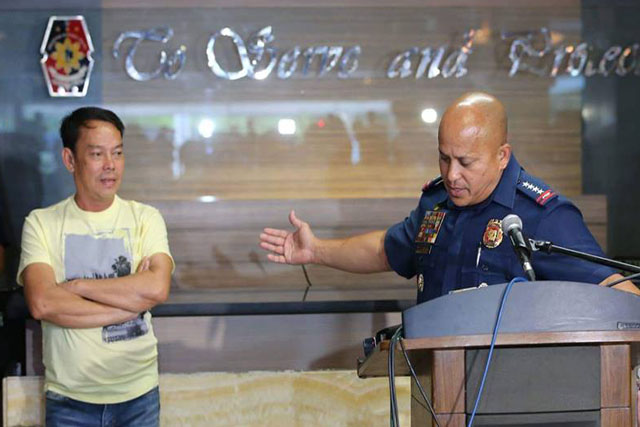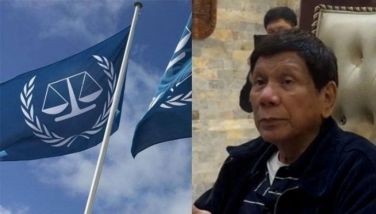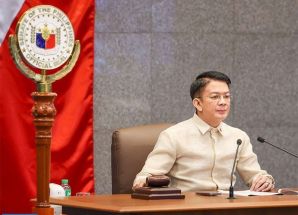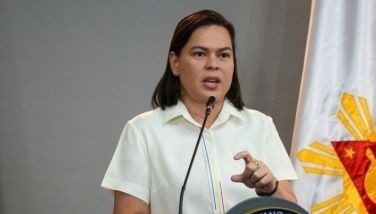Incoming health chief declares he is against contraceptives
May 22, 2005 | 12:00am
Though he has yet to assume office, incoming Health Secretary Dr. Francisco Duque III has already announced he is against artificial contraception, but promises to keep an open mind.
"I have five daughters and I never used artificial methods. I do not impose my beliefs on anybody," Duque said. "I am not saying that contraceptives are harmful, but they are still chemicals. We really have to know their side effects and if (those) side effects are bad for the health."
Duque said he is aware that family planning, particularly if achieved through artificial contraception, is the most controversial issue a secretary of the Department of Health (DOH) has to face.
He added that he had not yet formulated the government’s policy on the issue.
"I still have to talk with President Arroyo about her position on this. As her alter ego, whatever she wants, I have to implement," Duque said.
He also plans to meet with all sectors concerned with family planning to gather a consensus.
"The issue of family planning is dividing our people. I will talk to the groups, listen to what they have to say... Not everybody is Catholic in this country," Duque said.
The Roman Catholic Church is vehemently against artificial contraception and maintains that it is a sin to use such methods.
Duque said the challenge in dealing with population management is to look for common ground that will be acceptable to all parties concerned.
"We should also be sensitive to those who are not (Catholic). There are social, cultural and religious parameters that we have to use," he said.
Despite his personal stand, Duque said it is important to make reproductive health information and services available so couples could make informed choices.
Duque, who will formally take over from Health Secretary Manuel Dayrit on June 1, remembers playing within the sprawling DOH compound when he was four years old.
His late father and namesake, Dr. Francisco Duque Jr., was then the health secretary under the administration of the late President Diosdado Macapagal, Mrs. Arroyo’s father.
"In the few times that he brought me to the DOH, I would run around the premises. I would stroll, I would play there as a kid while waiting for him to come down from his office," said the younger Duque, who never thought that more than four decades later, he would assume the same post.
Duque is currently the president and chief executive officer of the Philippine Health Insurance Corp. (PhilHealth), an agency attached to the DOH.
When he takes over the helm of the DOH, Duque will have to give up his posts and assume chairmanship of PhilHealth’s board of directors, a position that is automatically given to the incumbent health chief.
He said he will continue the programs of Dayrit, a public servant he highly respects.
The 48-year-old Duque said he intends to place PhilHealth’s insurance system at the center of the country’s health-care program to ensure that more indigent Filipinos are covered.
He believes his experience with PhilHealth will serve him well at the DOH, saying he "will be the first secretary of health who will have a very strong background in health, economics, and health-care financing."
Duque boasted of increasing PhilHealth’s membership from 37.46 million in 2001 to 69.51 million in 2004 and boosting its collection from P11 billion to P16.5 billion for the same period. However, he is determined to expand PhilHealth’s coverage and provide more benefits to its members.
"It’s really a crusade on my part. The Medicare is actually a brainchild of my father in 1961 but was not passed by Congress then. They used to call it the National Health Services for the Philippines, but now it’s called the National Health Insurance Program (NHIP). He was really frustrated," Duque said.
The NHIP, formerly known as Medicare, is a health insurance program for private sector workers who are members of the Social Security System. The SSS, which administered the Medicare program, transferred this function to PhilHealth under the National Health Insurance Act of 1995.
Duque believes there is no need for lawmakers to pass a medical malpractice bill because patients are adequately protected by the patient’s bill of rights and other agreements with international organizations like the World Medical Association.
"It’s already reflected there, what sanctions need to be imposed... It’s just a matter of imposing it," he said.
Duque is worried that should this bill be passed into law, doctors would resort to a "defensive" practice of medicine and this would trigger an increase in the cost of health care in the Philippines.
For instance, "instead of ordering three laboratory examinations or diagnostic tests, a doctor would require 20 tests just to make sure that all areas are covered. When that happens, the patients would have to pay higher fees," he said.
Duque warned that doctor’s professional fees would also rise because they would need to get insurance to protect themselves against possible lawsuit. Doctors are also likely to pass on the added costs of the insurance premium to their patients, he said.
He is also worried that the ongoing exodus of health professionals, particularly doctors, to other countries puts the Philippine health-care system in crisis.
"It’s really saddening. Our entire health sector would soon be affected. Just like PhilHealth, it would be nothing if we don’t have doctors that could take care of our patients," Duque said.
He noted that there has been a decrease in enrollment in medical schools while many practicing doctors have taken up nursing courses to take advantage of the growing demand for nurses in other countries.
Duque intends to coordinate with the Philippine Medical Association, Congress and other government and private agencies to help slow down the migration of health professionals.
"We can’t blame them nor prevent them if they want to leave. But we really have to do something about this. This should be a national priority or it might reach emergency proportions," he said.
"I have five daughters and I never used artificial methods. I do not impose my beliefs on anybody," Duque said. "I am not saying that contraceptives are harmful, but they are still chemicals. We really have to know their side effects and if (those) side effects are bad for the health."
Duque said he is aware that family planning, particularly if achieved through artificial contraception, is the most controversial issue a secretary of the Department of Health (DOH) has to face.
He added that he had not yet formulated the government’s policy on the issue.
"I still have to talk with President Arroyo about her position on this. As her alter ego, whatever she wants, I have to implement," Duque said.
He also plans to meet with all sectors concerned with family planning to gather a consensus.
"The issue of family planning is dividing our people. I will talk to the groups, listen to what they have to say... Not everybody is Catholic in this country," Duque said.
The Roman Catholic Church is vehemently against artificial contraception and maintains that it is a sin to use such methods.
Duque said the challenge in dealing with population management is to look for common ground that will be acceptable to all parties concerned.
"We should also be sensitive to those who are not (Catholic). There are social, cultural and religious parameters that we have to use," he said.
Despite his personal stand, Duque said it is important to make reproductive health information and services available so couples could make informed choices.
His late father and namesake, Dr. Francisco Duque Jr., was then the health secretary under the administration of the late President Diosdado Macapagal, Mrs. Arroyo’s father.
"In the few times that he brought me to the DOH, I would run around the premises. I would stroll, I would play there as a kid while waiting for him to come down from his office," said the younger Duque, who never thought that more than four decades later, he would assume the same post.
Duque is currently the president and chief executive officer of the Philippine Health Insurance Corp. (PhilHealth), an agency attached to the DOH.
When he takes over the helm of the DOH, Duque will have to give up his posts and assume chairmanship of PhilHealth’s board of directors, a position that is automatically given to the incumbent health chief.
He said he will continue the programs of Dayrit, a public servant he highly respects.
The 48-year-old Duque said he intends to place PhilHealth’s insurance system at the center of the country’s health-care program to ensure that more indigent Filipinos are covered.
He believes his experience with PhilHealth will serve him well at the DOH, saying he "will be the first secretary of health who will have a very strong background in health, economics, and health-care financing."
Duque boasted of increasing PhilHealth’s membership from 37.46 million in 2001 to 69.51 million in 2004 and boosting its collection from P11 billion to P16.5 billion for the same period. However, he is determined to expand PhilHealth’s coverage and provide more benefits to its members.
"It’s really a crusade on my part. The Medicare is actually a brainchild of my father in 1961 but was not passed by Congress then. They used to call it the National Health Services for the Philippines, but now it’s called the National Health Insurance Program (NHIP). He was really frustrated," Duque said.
The NHIP, formerly known as Medicare, is a health insurance program for private sector workers who are members of the Social Security System. The SSS, which administered the Medicare program, transferred this function to PhilHealth under the National Health Insurance Act of 1995.
"It’s already reflected there, what sanctions need to be imposed... It’s just a matter of imposing it," he said.
Duque is worried that should this bill be passed into law, doctors would resort to a "defensive" practice of medicine and this would trigger an increase in the cost of health care in the Philippines.
For instance, "instead of ordering three laboratory examinations or diagnostic tests, a doctor would require 20 tests just to make sure that all areas are covered. When that happens, the patients would have to pay higher fees," he said.
Duque warned that doctor’s professional fees would also rise because they would need to get insurance to protect themselves against possible lawsuit. Doctors are also likely to pass on the added costs of the insurance premium to their patients, he said.
He is also worried that the ongoing exodus of health professionals, particularly doctors, to other countries puts the Philippine health-care system in crisis.
"It’s really saddening. Our entire health sector would soon be affected. Just like PhilHealth, it would be nothing if we don’t have doctors that could take care of our patients," Duque said.
He noted that there has been a decrease in enrollment in medical schools while many practicing doctors have taken up nursing courses to take advantage of the growing demand for nurses in other countries.
Duque intends to coordinate with the Philippine Medical Association, Congress and other government and private agencies to help slow down the migration of health professionals.
"We can’t blame them nor prevent them if they want to leave. But we really have to do something about this. This should be a national priority or it might reach emergency proportions," he said.
BrandSpace Articles
<
>
- Latest
- Trending
Trending
Latest
Trending
Latest
Recommended
































